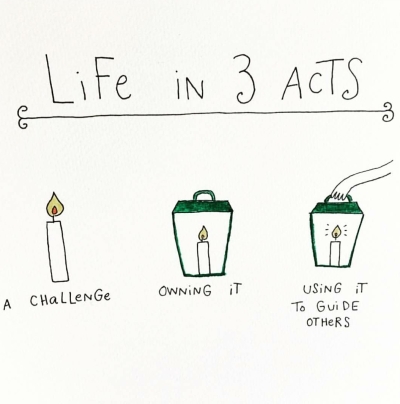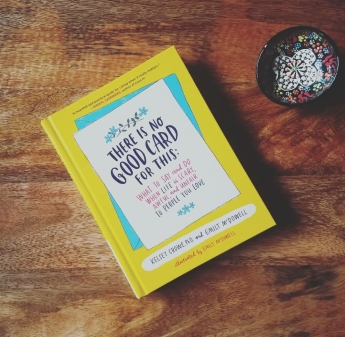The following TEN points may seem obvious. At least they do to me, but since we are all human and nobody is perfect I’ve decided to put this list together. Also, the first thing on my list happened to me today bringing to my attention that people need reminders every now and again. In fact, all ten points have happened to me, many of them on multiple occasions, so if you know all of this already please feel free to share it with somebody who doesn’t. It might prevent an awkward or upsetting situation from happening in the future and we all strive to be better people, right? I, for one, know that I’ve much to learn from others and their personal experiences. That’s one of the many reasons I read memoirs. When we immerse ourselves in somebody’s story, tapping into the struggle of another human being, we get to exercise our empathy muscles.
Here are my suggestions.
TEN things NOT to do when someone you know has lost their mother:
- DO NOT email a motherless daughter gift advertisements for Mother’s Day. I know, unbelievable right? Even so, it happened, and the person knows my mother isn’t alive. Just what I didn’t need in the mail. The message on the ad stated “Pamper your mother this Mother’s Day”. Really? Please don’t do this. It’s bad enough that our inboxes are automatically bombarded with these kinds of advertisements leading up to Mother’s Day.
- DO NOT invite them to your own Mother’s Day event and expect them to be in a cheerful mood for the entire party when everyone around you is celebrating the wonder of mothers and those who have them. (If the motherless daughter is particularly close to your mother, then this may be a different case, but please ask them sincerely if being at the party is where they want to be). I hear from women all of the time about how hard Mother’s Day events are for them, but they do it to please a partner or keep others happy.
- DO NOT post publicly about missing somebody who has died, on a date that is significant and meaningful to that person and their family, without a) asking permission of the grieving relative or person closest to the deceased b) referring to the grieving person and their own unique and significant pain and c) requesting that people connect with the grieving person on her page or privately. Posting about missing somebody after a death is a beautiful thing if the family has given you permission or if you were extremely close to the deceased. Please be mindful as to your approach. It’s hurtful to be tagged in someone else’s post about your own mother and follow along as they receive condolences throughout the day.
- (In connection with above post) DO NOT offer your condolences to somebody for their loss on another person’s page and simply assume, or hope that she’ll see it. A personal message, a kind gesture offered in private (rather than on someone else’s page) is more meaningful. Check to see if the bereaved person has written something of her own, describing her personal journey and offer a genuine response to that.
- TRY NOT TO FORGET significant dates, in particular death anniversaries, Mother’s Day and birthdays. Mark them on your calendar and make that call. Often it will only take five minutes. We can’t all remember significant dates for everyone. I get that. But if you have a very close friend or family member who suffered a major loss surely that date is etched in your brain? No. Then maybe take note and write it down in order to remember. What do most of us look for in a genuine lengthy friendship? I would say we wish to be thought of and held in that friend’s heart. Well, this includes being thought about on tough days like the anniversary of your mother’s death. We want to know that our friends haven’t forgotten our most challenging life experiences. Offer a kind and sincere thought on the anniversary of a rough day. Believe me, it makes a difference.
- DO NOT tell a motherless daughter that you wish you didn’t have to spend the day with your annoying, cranky mother. Just don’t.
- DO NOT compare your loss with somebody else’s. Grief is one of the hardest things life will ever throw our way. Losing a loved one changes us, and our lives forever. I feel deeply for any person who is grieving. For motherless daughters Mother’s Day can be miserable. The bombardment of advertisements telling us how we should pamper and celebrate our mothers when we no longer have them is heart-wrenching. For women whose babies/children have died it is a cruel reminder of a massive loss. The day is tough on widowed parents, terminally ill mothers and families where a terminally ill mother is fighting for her life. Let’s not compare one loss to another. This has happened to me, on several occasions for example in another story of mine. Pain is pain. Nobody wants to lose the person they love. We are all in this life together.
- DO NOT, if you are a teacher or a grown up, assume that a child has their mother at home. I still can’t believe how insensitive my teachers were following my mother’s death. “Take this home to your mother!” they would say, handing me a note for home. I would look at them in disbelief but they would continue on down the classroom aisle with no thought given to what they had said. These teachers were well aware of my loss. We were from a small town and my school was small. They just didn’t think about what they were saying or it didn’t matter enough to choose their words with more care.
- DO NOT tell a motherless daughter they should be over their loss by now. It doesn’t matter if it’s a year, twenty years or fifty years, we never ‘get over’ losing our mothers. I have dear friends who lost their mothers forty and fifty years ago and they still miss and long for them. I lost my mother thirty years ago and although the passage of time heals in some ways I’ve never stopped missing Mam. I’ve longed for her throughout my life at different periods such as when shopping for my wedding dress and other random moments.
- BE MINDFUL of speaking in a group about the blessing of having a nurturing, loving mother while a friend who is motherless sits listening. I am in no way suggesting to daughters (or sons) not to celebrate and cheer on their mothers because any love expressed is a beautiful thing. It warms my heart deeply to see mothers and daughters interact in loving ways. I wrote about the beautiful mother-daughter bond here and here. Be considerate, is what I’m saying. Two former friends gushed about their mothers in front of me one day. We had just returned to the college campus after a weekend at home. They described everything their mothers did for them, how nurturing they were and how much they loved them announcing “Where would we be without our mothers?” Granted I was blessed with a gem of a father so I could have shot back ”Where would we be without our fathers?” but my heart hung heavy by that point, not only as a result of being reminded of what I was missing, but because my two lovely friends forgot what I could never forget.
If we are more mindful in our interactions with friends, if we take the time to consider how we would feel in a particular situation and if we make the effort to learn from those who have gone through challenges then we’ll do just fine. I promise. And sincerely I appreciate all the love I receive on a regular basis since beginning this very personal journey of sharing.
Previously I wrote a piece on how to be present for someone who has lost their mother. If I can help comfort another woman or give ideas to those who want to do better for a grieving friend then I’m doing my work. I saw this picture on Instagram recently by Mari Andrew, a writer and illustrator based in NYC. I relate.

If you are interested in finding more tips or advice on how to help a grieving friend or someone going through a really tough time pick up a copy of this book by Kelsey Crowe and Emily McDowell. It’s packed with great advice.

Much love,
Carmel X
Like or follow my public Facebook page here where I frequently post articles, quotes & information about mother loss, grief and the writing process.


